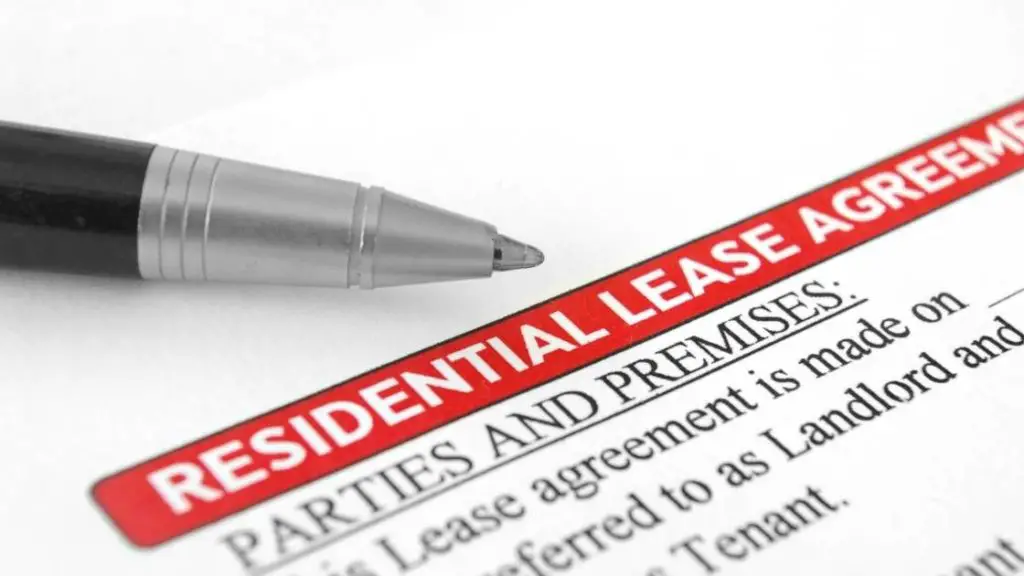Noise is one of the most common complaints that tenants have. If you are dealing with excessive noise from your neighbors or any other source, you may be at your breaking point and wondering if you can break your lease.
This article will discuss your rights as a tenant and whether or not you can break your lease due to noise.
The information contained in this post is for informational purposes only. It is not legal advice. You should seek the advice of a qualified legal professional before making any decisions relating to the topics covered by this article.
We may earn commissions from products and services that are purchased or recommended through our website as part of our affiliate partnerships. As an Amazon affiliate, we may earn from qualifying purchases.
The Definition Of A Lease

Let’s start with your lease.
A lease is a legal contract between a tenant and a landlord. In most cases, the tenant agrees to rent the property for a specific time and pays the landlord monthly or yearly rent. The lease outlines the rights and responsibilities of both parties, including in some cases, what can and cannot be done in regards to noise.
Many leases have provisions that address a tenant’s obligations to keep noise to reasonable levels, however, they may be silent on whether a tenant can break a lease if their neighbors are noisy or if there is excessive noise in general that is disturbing the tenant. In that case, you will need to look at your state’s laws (and in some cases, local laws).
That being said, if the noise is being caused by another tenant of your landlord, they likely have an identical lease to yours, so carefully read over any noise-related provisions in your lease and let your landlord know (in writing) that the other tenant is being excessively noisy.
Even if your lease doesn’t have a specific provision dealing with termination for excessive noise, you should read the entire lease carefully. There may be a general termination right that you can exercise by paying an early termination fee (I often see 1 months rent as the penalty). And, of course, if your lease is month to month, you can get out relatively easily and quickly just by giving notice to the landlord.
What Is Considered “Noise” Under The Law?
There doesn’t seem to be a uniform definition of excessive noise that is used across all legal jurisdictions.
In general, however, excessive noise is considered noise that goes beyond sounds associated with normal day to day activities, like noises from walking, talking, opening and closing doors, running the laundry, washing the dishes, vacuuming, etc.
Excessive noise, in contrast, could include loud music and parties, constantly barking dogs, unreasonable construction noise, and more. But even here, different states and localities may have different standards.
Note: If you want to explore your state’s laws, check out our 50 state reference table (including D.C.) that will link you to the official landlord tenants laws of your state.
If you prefer to have a lawyer assist you, I would try JustAnswer. They boast access to thousands of highly-rated, verified real estate lawyers whom you can connect with via their unlimited chat service.
By clicking the banner below, you can get a one week trial membership for only $5, which you can cancel at any time.

Can I Break My Lease Due To Noise?
In most cases, a tenant cannot break a lease due to occasional and normal levels of noise that may only amount to mild annoyance. However, if the noise is excessive and violates the right to quiet enjoyment of the property, then a tenant may be able to terminate the lease early without penalty.
As mentioned, tenants have the right to “quiet enjoyment” of their rental unit. This means that the landlord must take reasonable steps to prevent excessive noise from disrupting their peace. If the landlord fails to do so, a tenant may be deemed to be “constructively evicted” and could terminate the lease early without penalty.
It’s important to note that the landlord can only control so much.
So if another tenant of your landlord is causing this excessive level of noise, then the landlord has some control over that and should take steps to stop it. But if the person that is causing the noise is not a tenant of your landlord, their hands may be tied.
Talk with Your Landlord to Discuss Early Termination

If neither the law nor your lease provide a clear way to terminate your lease (e.g., the noise is not excessive enough under law or the terms of your lease), you may still want to talk with your landlord to discuss early termination options.
A lot of times landlords don’t want an unhappy tenant because they fear that the tenant will become a “problem” tenant.
Landlords will want to avoid this so in a lot of cases, they may be willing to find a mutually agreeable solution.
One great option is to see if they would be willing to let you out of the lease if you can find a new (and suitable) tenant for them to take over the lease or sign a new lease. I have written a full article on how you can do this here.
Or you could offer to pay the landlord for the right to exit the lease. If you don’t want to shell out any money, you can suck it up and wait for the lease to end. You will need to read the lease carefully to make sure it does not “auto-renew” though (or if it does, you must remember to provide timely notice to the landlord that you don’t want to renew).
A final option you can use if all of the other ones fail is to just vacate the property. Now you will likely be on the hook to pay the remaining rent in most cases, so there are definitely some risks to doing this.
But in many states, the landlord will be required to mitigate their losses and will need to find a replacement tenant. Once the replacement tenant comes in and starts paying rent (assuming it’s at least the same rent as yours), you will be off the hook for the remaining rent payments.
Bear in mind that, although they are obligated to try to find a replacement tenant, they may not be able to do so quickly (or at all) if the rental market is soft. That means you will be responsible for any remaining rental payments under the lease until they can do so. That could be a lot of money if you have a long time left on your lease.
Another risk of breaking your lease like this is that a landlord may report any non-payment of rent to credit reporting agencies and take you to court. These actions can have a serious and negative impact on your credit score, which could affect your ability to rent a new place in the future.
But before you choose this final option, consider whether there are any other grounds for termination that we haven’t covered already.
Check out my full article on how to break your lease early without penalty for more details. It includes 11 situations where you can terminate early (plus one bonus option that applies in all situations).
Conclusion
Dealing with constant and excessive noise in in your own home is a horrible situation, but the good news is that you may have some solid options to terminate your lease early. Make sure to check your state and local laws (as well as your lease) to see what options are available and take action.


